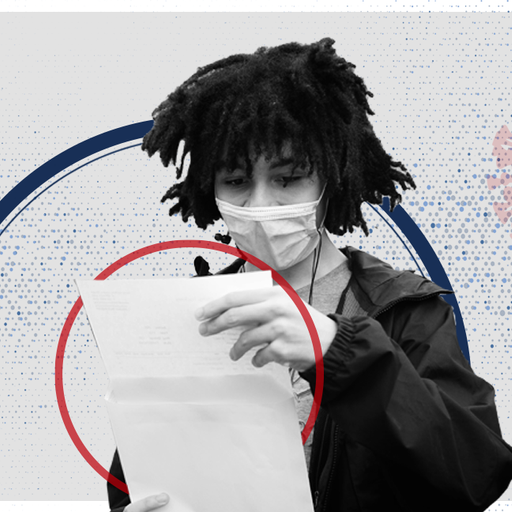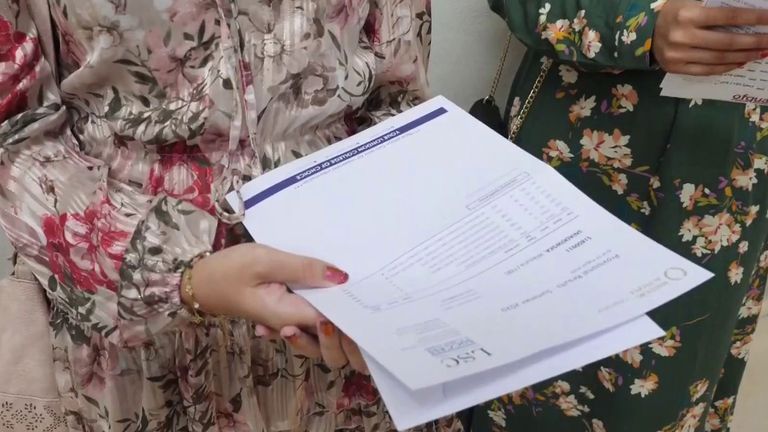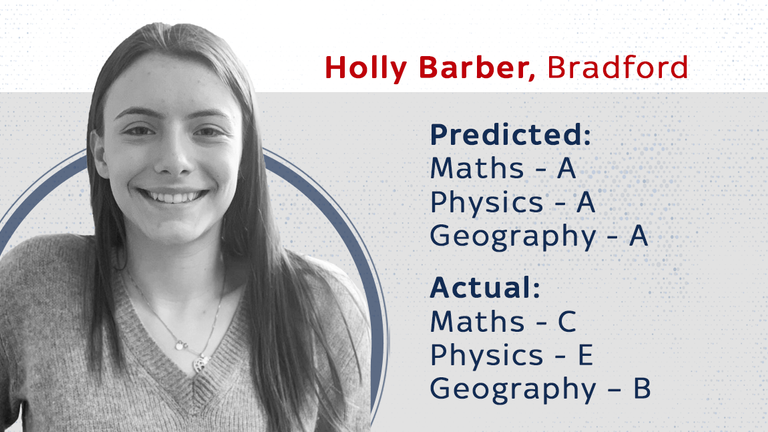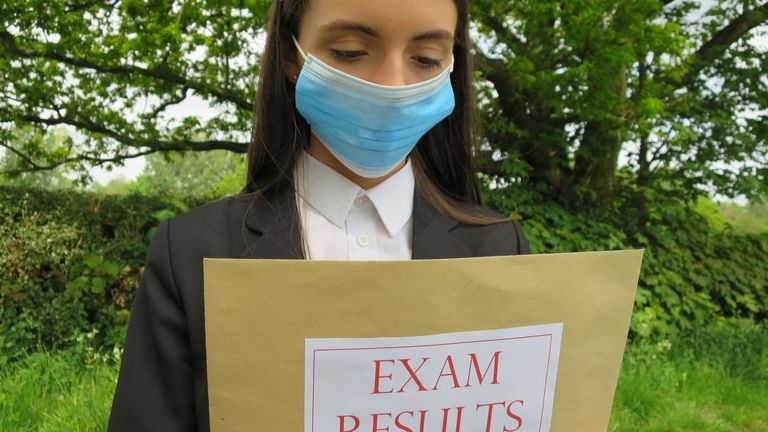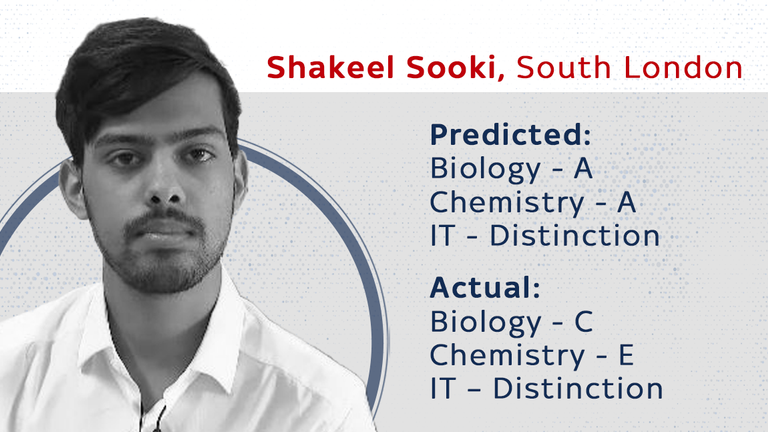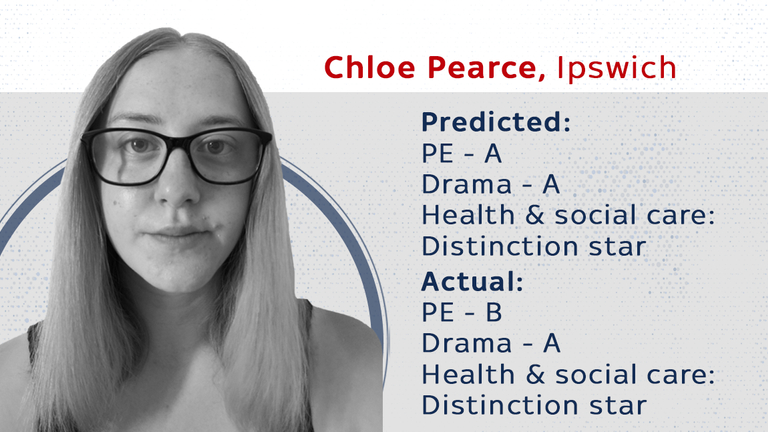A-Level results: These students were predicted to get As - but an algorithm threw their futures into chaos
One pupil explains how being downgraded throws her bursary into doubt, while another says he feels "betrayed".
Thursday 13 August 2020 21:50, UK
Some A-level students say moderators have "ruined their results" as almost 40% of grades were downgraded in England after exams were cancelled due to coronavirus.
Nearly two in five (39.1%) of teachers' estimates for pupils were adjusted down by one grade or more by an assessor's algorithm, which amounts to around 280,000 entries.
There have been accusations the predictive computer programme designed by exam regulator Ofqual bakes-in social inequality by assuming that pupils in disadvantaged, low-performing schools will do worse than others.
It's not quite as simple as that, but here is how the algorithm works:
First the students are ranked and given a grade by their teachers. The programme uses this, but then applies other factors.
So a low ranked A grade could slip to a B if the student's cohort performed less well in previous years. The classmates' average GCSE results and key stage 2 assessments appear to be a factor in the algorithm.
The teachers' grades are also set against the school's performance in previous years.
So, if the algorithm sees too many As and Bs given by the school - it will adjust the lower ranked students downwards. In the worst-case scenario, the A grade student is downgraded even further to a C.
Also, if a school has only one high achiever every four years, and it has not been four years since their last high achiever, then most likely pupils in 2020 will not get high grades.
Here, students tell Sky News how the controversial grading method affected their results.
Holly Barber, 18, from Woodhouse Grove School, Bradford
I feel a bit embarrassed that I've been wrongly graded for all my efforts at school.
I've spent two years trying to get the best results possible and this looks like I've not even tried at all at school. I feel it's completely unfair.
I went into school this morning and they told us they'd spent hours in meetings, going through everything carefully to get us the right grades.
So then to be dropped from a predicted A to an E in physics for no reason at all... it's just demoralising.
This will have a big impact on my future.
The government have completely ruined a lot of kids' futures.
Every single person I've talked to has been downgraded. I feel like we've been screwed over. I've messaged so many people in my year and they've all been screwed over.
Shakeel Sooki, 18, Bexleyheath Academy, south London
I feel a bit betrayed. My teachers did their upmost best to help me and gave me all the support possible to do all my work.
My mocks in Year 12 weren't particularly good, but with all the extra help, they were improving.
Literally, my last mocks in chemistry and biology before we broke up were two As, so I knew that before lockdown happened if I did the exams and kept up with the work I was doing I could easily get an A and meet my offers.
I still had some hope they would see my last mocks and take that into account. Unfortunately they haven't... I can do a lot better.
I don't feel like it's been handled particularly well - not a lot of information has come out, they just abruptly announced some changes because they saw how Scotland handled it and the backlash they received from the way they worked it out.
It seems that students this year have had to take a back seat.
Chloe Pearce, 18, from Northgate Sixth Form College, Ipswich
I was very frustrated and rather angry at the whole system, at how the whole thing worked out.
I had been looking forward to results day, I thought: 'I've got these grades in the bag, there's no reason I should be downgraded because there's evidence enough from my mocks and my work throughout the year to show I deserve the grades.'
It's just been a bit of shock to the system, really.
My entire PE class had been downgraded. It's happened to everyone.
I know lots of people in my class had offers for Loughborough, and they needed an A in PE for that. They've all missed out on those offers because it seems the highest offer anyone has got in PE is a B.
It's an absolute shambles. There are a lot of really disappointed students.
I've got an unconditional offer at Suffolk, but this lower grade impacts on whether I can get a bursary. I'm really lucky I've got my uni place so I'm guaranteed that but the extra bursary would have really helped. It's going to be difficult."
At a school in east London, nearly half (47%) of the grades predicted by their teachers were modified downwards.
The overwhelming feeling of many students at Leyton Sixth Form College is that their individual school achievements, recognised by their teachers, have been robbed by the algorithm.
Wiktoria Sniadowska says she was predicted by her teachers to get A, A, A and hoped to study fine art - but the algorithm gave her B, B, C.
She said: "They've ruined my results."
And Shadman Siraz was hoping to get into King's College or Queen Mary University to study economics. He was expecting A, A, B but ended up getting B, B, C.
He said: "I don't have the grades to go to university. I don't feel I've been fairly marked - my predictions were way higher than this. I could have done better in an actual exam."
Head of maths at Leyton Sixth Form College, Nicholas Moore, said: "What appears to have happened is they've taken the historical results for an institution. They've taken the past results for a cohort of students - so not for the individual - and used that to predict the grades and then used the teachers ranking to generate who gets what grades.
"No account appears to have been taken for the actual centre-assessed grade which we spent hundreds of hours preparing."
He added: "The problem with using ranking is when you rank 100 students what's the difference between 55 and 56 - but it's those students on the borderline that risk being downgraded."
In England, the government has outlined a "triple lock" process that could help students boost their results.
This would allow a pupil to either accept their calculated grade, appeal to receive a valid mock result, or sit a new exam in the autumn.
Sally Collier, chief regulator of Ofqual, said: "I'm confident that results from the system that we've put in place are fair for the vast majority of students and I appreciate that there are individual students here with individual grades.
"No system could have predicted exactly what that student would've got had they taken their exams.
"We're confident that this system is fair, and when it's not been fair - this is new system for five million grades - then there is a process for individuals through their schools to fix these things and fix them quickly."

